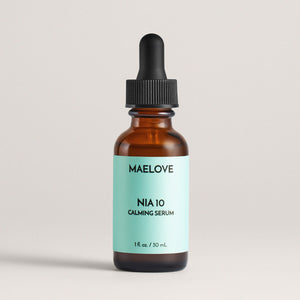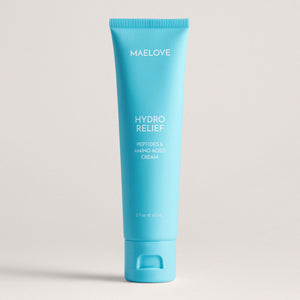Today we answer the question, why do I still need vitamins in my skincare products IF I eat a well-balanced diet?
These vitamins include retinoids which are Vitamin A derivatives, antioxidants like Vitamins C and E, and Niacinamide which is Vitamin B3. And as you know these are some of the most popular and recommended ingredients to apply on your skin by dermatologists.
So you may be wondering - if I ingest these vitamins through my diet or take multivitamins everyday, then why do I need to also put these ingredients on my skin?
I actually wondered the same thing before starting Maelove. I’m personally really interested in supplements and always trying to keep up with the information out there, and I had also asked myself the same question.
This actually turned out to be a pretty complicated question and the answer is different for each vitamin. So let’s unpack one at a time.
Let’s look at retinoids, which are Vitamin A derivatives. You can take these orally by prescription and that is one way to fix problems like acne.
For example, you can get a prescription for Accutane which is a retinoid called Isotretinoin. Accutane comes with a lot of downsides though.
The reason is because Vitamin A has different functions in different parts of your body. And ingesting it at high levels can interfere with these processes in different ways and can cause harm.
For example, you have to be very cautious when being pregnant and taking Accutane as it causes birth defects.
Also, Vitamin A as group, as a whole, is fat soluble which means your body will store it in your tissues rather than flush out the excess through your urine.
This can cause a buildup of Vitamin A in your body and can become harmful. This is why your doctor will tell you to stop taking Vitamin A supplements while on Accutane.
Further, in some rare instances, Accutane can cause life threatening conditions such as increased pressure in the brain and cause strokes. More commonly, Accutane may cause nausea, dizziness, and blurred vision.
So for retinoids, you might be better off to apply the retinoid onto your skin where you want it to be effective in boosting collagen production. It’s better to avoid introducing retinoids into a systemic circulation, to your whole body, where too much Vitamin A may have significant downsides.
Of course, we still don’t recommend topical retinoids when you are pregnant, but this is out of an abundance of caution as very little retinoid will penetrate through all your skin layers and enter your blood stream.
Basically, the reason we apply retinoids topically is to get all the skin benefits of using a high level of Vitamin A product without all the complications and downsides of orally ingesting high levels of vitamin A that can have a systemic impact throughout the body.
Now, let’s talk about Vitamin C, which is an important antioxidant that has many health benefits and some studies suggest, may even help prevent cancer.
As good as Vitamin C is, there are many controls in the body on how much Vitamin C is absorbed and no matter how much you ingest, your body will only retain a certain amount and the rest will come out when you urinate. Why is that? Because Vitamin C is water-soluble, it doesn’t accumulate in our fat tissues like Vitamin A can.
One thing to keep in mind is that especially as we get older, there is a limit to how much Vitamin C can reach our skin.
While the exact mechanisms aren’t entirely known, it has been shown that Vitamin C levels in your dermis and epidermis fall with aging. And dietary supplementation cannot overcome this deficit.
Since your epidermis needs to pull Vitamin C from the dermis, which is the deeper layer of skin that receives blood flow, decreased blood flow to your dermis may directly affect the levels in the epidermis.
There is a fascinating study published in 1993 by Tsuchida in the Journal of Dermatological Sciences that showed the blood flow to your skin at 70 years old decreases to less than half, about 40% that of a 20 year old (see figure).

Reproduced from Tsuchida 1993
This is why topical supplementation - basically skincare products - can help. Instead of orally ingesting these vitamins, you can get nutrients to this organ, the skin, when blood flow is reduced through topical supplementation.
For Niacinamide, Vitamin B3, the picture is different yet again, and it relates to fundamental aging of your cells, a process called senescence.
Basically, as you age, your cells start being worse and worse at functioning properly.
Niacinamide is important because it’s a precursor to very important cofactors inside your cells. And these cofactors are necessary for many enzymes to function properly, and these include enzymes that make lipids such as ceramides and proteins such as keratin, which make up your skin barrier - the bricks and mortar of stratum corneum.
Basically, the more niacinamide you have, the more cofactors, and then more ceramides and more keratin production.
It has been shown that aging skin cells themselves make less and less of these cofactors as you age, but that you can increase the levels of these cofactors in older skin cells with Niacinamide supplementation.
In other words, as you age, you need more Niacinamide to maintain the same level of Niacinamide-derived cofactors in your skin.
So when you topically supplement Niacinamide to your skin, you are introducing a heightened level of the vitamin to compensate for senescence of your skin cells.
So the bottom line is that both oral and topical supplementation of certain vitamins can help keep the health of your skin and body in tip top shape.
Topical supplementation helps increase the levels of these beneficial vitamins.
And at the same time, topical supplementation can help you avoid the complications of systemic circulation by specifically targeting where you want the nutrients to go and where it’s needed and not somewhere where too much vitamins would be harmful.
And topical supplementation compensates for aging related changes that lead to diminished blood flows and functioning of skin cells.
Click here to see Maelove product offering
Reference
Tsuchida Y (1993). “The effect of aging and arteriosclerosis on human skin blood flow.” J Dermatol Sci 5(3): 175-181.






